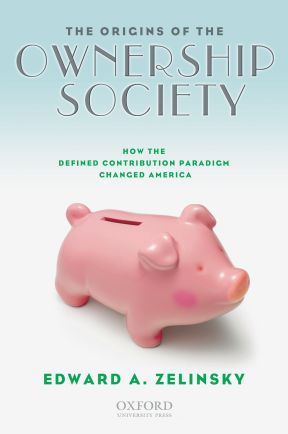Edward A. Zelinsky is the Morris and Annie Trachman Professor of Law at the Benjamin N. Cardozo School of Law of Yeshiva University. He is the author of The Origins of the Ownership Society: How The Defined Contribution Paradigm Changed America. In the article below he looks at the Clinton’s federal tax returns.
President and Senator Clinton’s federal tax returns provide much fodder for commentators who are debating a diverse set of questions in light of those returns: Has Mr. Clinton understandably maximized his post-presidential income in our celebrity-crazed culture – or has he exploited the presidency for unseemly financial gain? Does the Clintons’ private foundation reflect a worthy model of charitable giving – or the federal fisc’s subsidization of Senator Clinton’s presidential candidacy? Was Mr. Clinton financial relationship with Yucaipa appropriate for a former president – or for the spouse of a prospective president?
The Clintons’ tax returns raise one further issue which also requires public discussion: The federal subsidy the Clintons have received over the last seven years while earning in excess of $100 million. Mr. Clinton’s aggressive pursuit of post-presidential income is incompatible with the extensive public support he has received from federal taxpayers since leaving office. That public support was designed to preclude the nation’s chief executives from facing financial hardship after their terms of office. It was not intended to subsidize the aggressive pursuit of a post-presidential fortune.
the extensive public support he has received from federal taxpayers since leaving office. That public support was designed to preclude the nation’s chief executives from facing financial hardship after their terms of office. It was not intended to subsidize the aggressive pursuit of a post-presidential fortune.
The federal taxpayer’s subsidy of Mr. Clinton has several components. First, as a former president, Mr. Clinton is entitled to receive, for the remainder of his life, the salary of a cabinet secretary. That salary is today $191,000 per annum. In addition, as a former president, Mr. Clinton also receives, at taxpayer expense, “suitable office space appropriately furnished and equipped.” Mr. Clinton’s office in New York City costs federal taxpayers over $700,000 per year to lease and operate. Federal taxpayers also defray the salary and benefits for office staff and some of Mr. Clinton’s travel outlays. The General Services Administration currently budgets for all of these costs a yearly total of $1,162,000 for Mr. Clinton. The equivalent annual figures for former President Bush and former President Carter are $786,000 and $518,000 respectively.
In addition, Mr. Clinton is also entitled, at taxpayer expense, to Secret Service protection for the remainder of his lifetime – even though, as president, Mr. Clinton signed legislation limiting Secret Service protection for his successors to the first ten years after they leave office.
For most Americans, Mr. Clinton’s package would constitute a heady lifestyle. For President and Senator Clinton, however, this post-presidential package merely provided a tax-financed base for the aggressive pursuit of unprecedented financial gain for a former chief executive.
Mr. Clinton has apparently treated as tax-free much of the federal largesse he has received. While the Clintons’ federal tax returns report as taxable income his cabinet-level salary payments, he has apparently elected to exclude from his taxable income the other benefits he receives, namely, his federally-financed office, staff, travel costs and protection.
If the Clintons had treated these items as taxable, they most likely would have been reported on their Forms 1040 on line 21 for “other income”. On the Clintons’ 1040 for 2006, line 21 is blank, suggesting that they did not include in income the office, staff, travel costs or protection provided to them by federal taxpayers.
The tax-free treatment of this federal subsidy of Mr. Clinton makes it particularly valuable for him.
This post-presidential package and the federal subsidy it represents were not intended as a conventional deferred compensation arrangement. They instead reflect the judgment that former presidents should not be required to hustle in the marketplace after they leave office.
The story of an impoverished Ulysses Grant, financially-impelled to write his memoirs as he was dying of cancer, is an iconic image of American history. From this tragedy, the world received one of the great military autobiographies of all time. However, most Americans would prefer that the nation’s former leaders not confront the kind penury which plagued Grant at the end of his life.
The immediate stimulus for the modern post-presidential compensation package was the report that former president Truman lacked the resources to return his mail from the American public.
This post-presidential package was designed to preclude Grant’s and Truman’s successors from experiencing the financial problems they confronted. It was not intended to serve as a federal subsidy for the aggressive pursuit of a post-presidential fortune.
President Clinton is not required to accept all or any of the proffered subsidy from the federal Treasury. He can also make a payment to the federal fisc reimbursing it, in whole or in part, for the costs of this subsidy. Such reimbursement could, for example, be geared to the taxes Mr. Clinton would pay if his post-presidential benefits were treated as taxable income.
The federal taxpayers provide post-presidential benefits so that former chief executives will not replicate the unfortunate financial history of Grant or even the more moderate financial discomfort in which President Truman found himself. We do not subsidize former presidents so that they may pursue lucrative private sector careers. As a federal taxpayer subsidizing Mr. Clinton’s lifestyle, I hope he feels my pain.


